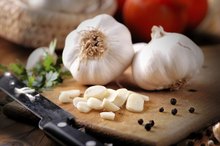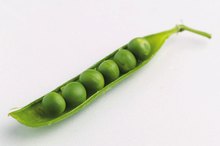Inulin Fiber Side Effects
Fiber consists of the carbohydrates that are not broken down or absorbed by your digestive tract. Because increasing your dietary fiber can benefit your body in many ways, many manufacturers have begun to add fiber sources, such as inulin, to their products to boost the fiber content. This can benefit your digestive tract and may help keep you feeling full longer. However, consuming inulin can cause some mild side effects, though they are generally not serious.
Inulin
Inulin is a kind of soluble fiber which can be found in many fruits and vegetables, such as garlic, wheat, bananas and onions. Inulin belongs to a class of compounds known as fructans, which are classified as fibers because they are unabsorbed by the human digestive tract. Although inulin occurs naturally in some foods, it can also be extracted from chicory root and used as an additive to increase the amount of fiber present in some foods.
Digestive Problems
Inulin Vs. Psyllium
Learn More
Just because inulin is not absorbed by your body does not mean that it doesn't cause any side effects. A 2010 article in the Journal of the American Dietetic Association examined the side effects of consuming inulin in volunteers. People who consumed inulin occasionally experience flatulence and bloating. Notably, these side effects were most severe for the volunteers who consumed 10 g of inulin, which was the highest dose.
- Just because inulin is not absorbed by your body does not mean that it doesn't cause any side effects.
- A 2010 article in the Journal of the American Dietetic Association examined the side effects of consuming inulin in volunteers.
Gas Side Effects
Although inulin doesn't get broken down by your digestive enzymes, it does not pass through your digestive tract completely unchanged. As a 2005 article in the British Journal of Nutrition explains, inulin functions as a prebiotic, which means that it serves as a food source for the bacteria which naturally live in your intestines. This is actually one of the benefits of inulin, as these bacteria are important for the health of your digestive tract. On the other hand, when these bacteria break down inulin, they produce gas, resulting in flatulence and bloating.
- Although inulin doesn't get broken down by your digestive enzymes, it does not pass through your digestive tract completely unchanged.
- As a 2005 article in the British Journal of Nutrition explains, inulin functions as a prebiotic, which means that it serves as a food source for the bacteria which naturally live in your intestines.
Preventing Side Effects
Fructans in the Diet
Learn More
One way to reduce the side effects of consuming inulin is to start with a low level and gradually increase the amount you consume. Starting with a high dose of inulin may be difficult for your digestive tract and can increase the side effects. By starting with a lower dose, you give your intestines and their bacteria time to adjust to the inulin, which can minimize the gas produced.
Related Articles
References
- "Journal of the American Dietetic Association"; Gastrointestinal Tolerance of Chicory Inulin Products; Bonnema et. al.; December 2009
- "British Journal of Nutrition"; Introducing Inulin-Type Fructans; Roberfroid MB; 2005.
- Wolfram, Taylor. Functional foods. Academy of Nutrition and Dietetics.
- Cresci GA, Bawden E. Gut microbiome: What we do and don't know. Nutr Clin Pract. 2015;30(6):734-746. doi:10.1177/0884533615609899
- Chen K, Chen H, Faas MM, de Haan BJ, Li J, Xiao P, Zhang H, Diana J, de Vos P, Sun J. Specific inulin-type fructan fibers protect against autoimmune diabetes by modulating gut immunity, barrier function, and microbiota homeostasis. Mol Nutr Food Res. 2017;61(8). doi:10.1002/mnfr.201601006
- Liu F, et. al. Effect of inulin-type fructans on blood lipid profile and glucose level: a systematic review and meta-analysis of randomized controlled trials. Eur J Clin Nutr. 2017;71(1):9-20. doi:10.1038/ejcn.2016.156
- Hume MP. Prebiotic supplementation improves appetite control in children with overweight and obesity: a randomized controlled trial. Am J Clin Nutr. 2017;105(4):790-799. doi:10.3945/ajcn.116.140947
- Liber A, Szajewska H. Effects of inulin-type fructans on appetite, energy intake, and body weight in children and adults: Systematic review of randomized controlled trials. Ann Nutr Metab. 2013;63(1-2):42-54. doi:10.1159/000350312
- Abrams SA, Hawthorne KM, Aliu O, Hicks PD, Chen Z, Griffin IJ. An inulin-type fructan enhances calcium absorption primarily via an effect on colonic absorption in humans. J Nutr. 2007;137(10):2208-12. doi:10.1093/jn/137.10.2208
- Ferguson, Laura. 10 things you need to know about fiber. A nutritional epidemiologist separates the facts from the hype. Tufts Nutrition.
- Wolfram, Taylor. Prebiotics and probiotics creating a healthier you. Academy of Nutrition and Dietetics.
Writer Bio
Adam Cloe has been published in various scientific journals, including the "Journal of Biochemistry." He is currently a pathology resident at the University of Chicago. Cloe holds a Bachelor of Arts in biochemistry from Boston University, a M.D. from the University of Chicago and a Ph.D. in pathology from the University of Chicago.








